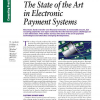Free Online Productivity Tools
i2Speak
i2Symbol
i2OCR
iTex2Img
iWeb2Print
iWeb2Shot
i2Type
iPdf2Split
iPdf2Merge
i2Bopomofo
i2Arabic
i2Style
i2Image
i2PDF
iLatex2Rtf
Sci2ools
125
Voted
AC
2000
Springer
2000
Springer
State of the art in electronic payment systems
nvented abstract representations of value. As time passed, representations of value became more abstract, progressing from barter through bank notes, payment orders, checks, credit cards, and now electronic payment systems. Traditional means of payment suffer from various well-known security problems: Money can be counterfeited, signatures forged, and checks bounced. Electronic means of payment retain the same drawbacks and some additional risks: Unlike paper, digital "documents" can be copied perfectly and arbitrarily often; digital signatures can be produced by anybody who knows the secret cryptographic key; a buyer's name can be associated with every payment, eliminating the anonymity of cash. Thus without new security measures, widespread electronic commerce is not viable. On the other hand, properly designed electronic payment systems can actually provide better security than traditional means of payments, in addition to flexibility of use. This article provides an ...
| Added | 17 Dec 2010 |
| Updated | 17 Dec 2010 |
| Type | Journal |
| Year | 2000 |
| Where | AC |
| Authors | N. Asokan, Philippe A. Janson, Michael Steiner, Michael Waidner |
Comments (0)

